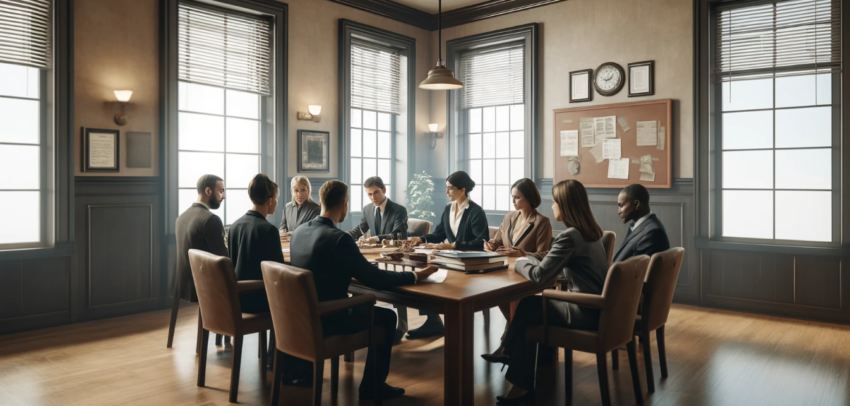| Listen to our audio presentation: Understanding the Global Nuclear Proliferation |
In a Manhattan courtroom, the jury has departed to deliberate in the historic criminal trial against former President Donald Trump. This highly anticipated trial, revolving around allegations of falsifying business records to cover up a hush money payment, marks the first-ever criminal trial for a former U.S. president. Here’s a comprehensive look at the closing arguments, the jury’s role, and what the verdict could mean.
During deliberations, jurors are completely isolated from outside communication, having surrendered their phones. They must be unanimous in their decision to either convict or acquit Trump on the 34 felony counts he faces. Given the complex nature of the charges and the significant amount of evidence and testimony presented, juror discussions could take days or even weeks.
The Role of Deliberations
The jury took with them all the evidence admitted at trial, and they can request to hear witness testimony again if needed. They can also send handwritten notes to the court if they have questions about the case.
Should the jury pose a question, Trump, his attorneys, and the prosecutors must gather to determine the best response. This scenario keeps everyone, including Trump, tied to the courthouse until deliberations conclude.
The foreperson, selected among the jurors, will ultimately deliver the verdict for each count, bringing potentially historic consequences to a close.
A Tale of Two Closing Arguments
Tuesday witnessed a dramatic showdown of closing arguments. Manhattan Assistant District Attorney Joshua Steinglass methodically dismantled the defense’s narrative, while Trump’s chief counsel, Todd Blanche, struggled to mount a coherent closing argument.
Steinglass’ summation, as reported by Dennis Aftergut for Slate, connected evidence piece-by-piece to the elements of the alleged crimes. He offered a plainspoken narrative of how Trump and his associates allegedly falsified business records to cover up hush money payments linked to election law violations.
“The defendant used his own business records as the vehicle to disguise the reimbursement because he didn’t want anyone finding out about the conspiracy to corrupt the election,” Steinglass said.
Missing the Mark: Todd Blanche’s Defense
Blanche’s lengthy and often confusing closing argument seemed more focused on assuaging Trump than on dismantling the prosecution’s case. He repeatedly attacked the credibility of Michael Cohen, Trump’s former lawyer and fixer, who testified against him. Yet, Blanche failed to counter key points convincingly, such as the prosecution’s “smoking gun”—the notes from Trump Organization CFO Allen Weisselberg.
Blanche’s claim that Weisselberg’s notes were fabricated didn’t hold much weight without evidence. He also insisted that the $420,000 mischaracterized as a reimbursement for legal expenses was genuine, despite extensive evidence to the contrary.
Blanche had points where he could have better attacked the prosecution’s case but failed to focus on these critical areas. He also attempted to downplay the impact of the headlines Trump sought to quash, arguing they couldn’t realistically sway an election.
Prosecutor’s Focus: The Scheme and Consequences
Steinglass seized upon the weaknesses in Blanche’s argument. He emphasized the elaborate steps taken to conceal the payments and how they suggested Trump’s knowledge of their illegality. “A whole lot of time, thought, and energy to conceal the truth,” Steinglass said.
Moreover, Steinglass dismissed Blanche’s assertion that positive stories in the National Enquirer couldn’t affect the election. He turned this around, framing the hush money payments as a deliberate subversion of democracy rather than its exercise.
In his summation, Steinglass also highlighted the absence of several potential defense witnesses, including Allen Weisselberg and Trump’s sons, who signed checks tied to the case. This absence raised questions about their potential testimonies.
The Implications and Next Steps
This trial is unprecedented and could set a legal precedent for holding sitting and former presidents accountable. The jury’s eventual decision will resonate far beyond the courtroom, influencing the 2024 presidential race, where Trump is a leading candidate for the Republican nomination.
Information Box
– The criminal trial against Donald Trump is the first-ever of a former U.S. president.
– Trump faces 34 felony counts for falsifying business records to allegedly cover up a hush money payment to adult film star Stormy Daniels during his 2016 presidential campaign.
– Jurors have no access to their phones and must deliberate in complete isolation until a unanimous verdict is reached.
– Manhattan Assistant District Attorney Joshua Steinglass presented a detailed, methodical closing argument, emphasizing Trump’s concealment efforts.
– Trump’s chief defense counsel, Todd Blanche, struggled to offer a coherent defense, focusing heavily on discrediting key witness Michael Cohen.
Sources
Reference 1: CNN Staff, “Here’s what happens during jury deliberations,” CNN.
Reference 2: Dennis Aftergut, “Trump’s Lawyer Missed the Mark in His Closing Argument,” Slate, May 29, 2024.
Reference 3: Ximena Bustillo, “The last words: What each side said in closing arguments for Trump’s New York trial,” NPR, May 28, 2024.

